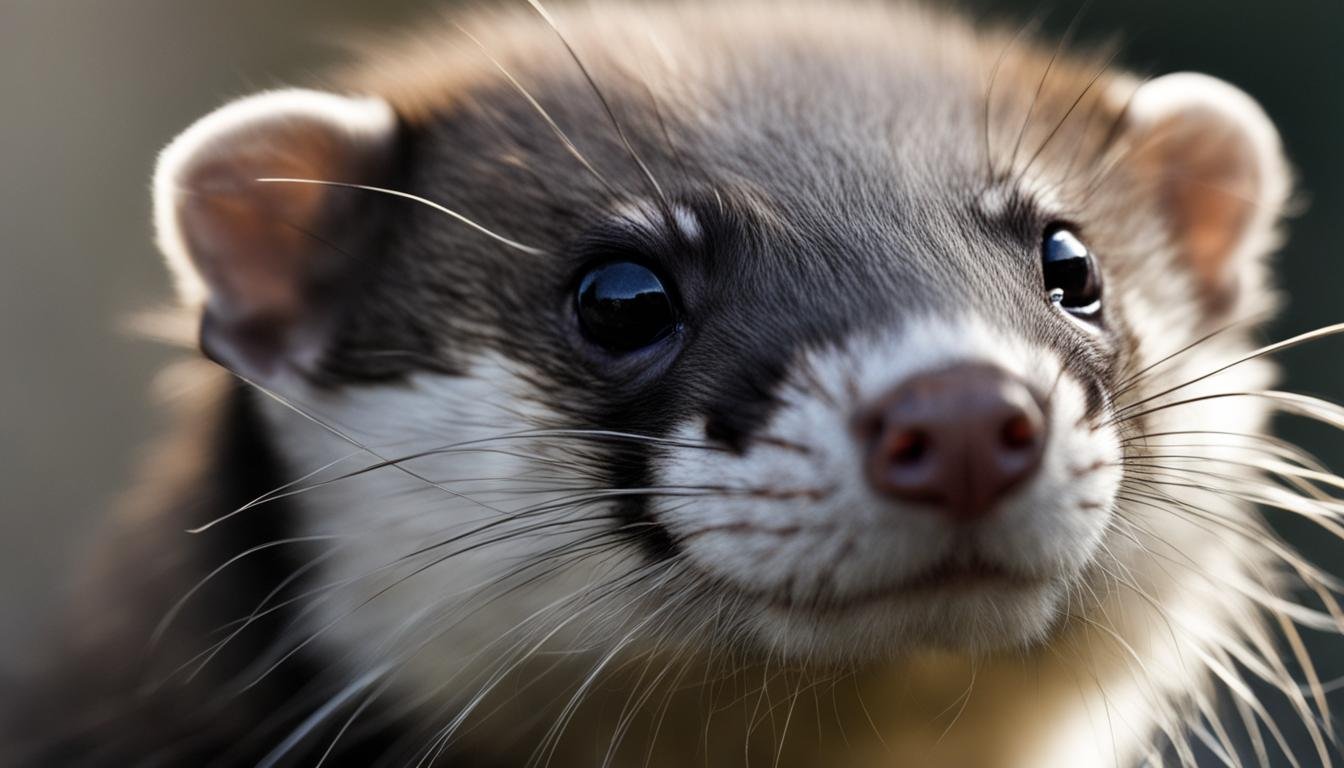Hair loss, or alopecia, is a common health problem seen in pet ferrets. If you’ve noticed your furry friend experiencing bald spots or thinning hair, it’s important to understand the causes and treatment options for ferret hair loss.
There are various factors that can contribute to hair loss in ferrets, including hormonal imbalances, adrenal gland disease, parasites, and infections. Identifying the cause of your ferret’s hair loss is crucial in order to provide the appropriate treatment and prevent further balding.
In this article, we will explore the different reasons why your ferret may be losing hair and discuss the available treatment options. Whether it’s managing seasonal sheds, addressing hormonal imbalances, or controlling parasite infestations, we’ve got you covered.
So, if you want to help your adorable ferret regain its luscious coat, read on to discover the causes and solutions for ferret hair loss.
Hormonal Hair Loss In Ferrets
Ferrets, just like other animals, experience hair loss due to various factors. One common cause of hair loss in ferrets is hormonal imbalances. These imbalances can result in seasonal sheds and hair loss during specific periods.
Seasonal Sheds:
Ferrets go through two seasonal sheds each year. In the spring, they shed their winter coat and put on a thinner summer coat, then in the fall, they shed their summer coat and grow a thicker winter coat. This natural shedding process is a normal part of a ferret’s lifecycle and is influenced by hormonal changes. During these shedding seasons, it is common for ferrets to experience hair loss.
Breeding Season:
In addition to seasonal sheds, intact female and male ferrets may also experience hair loss during the breeding season. This is again due to hormonal changes that occur in response to the mating behavior of ferrets. The hair loss during the breeding season is temporary and resolves once the mating cycle is complete.
To manage hormonal hair loss in ferrets, it is important to provide them with appropriate care and nutrition. A balanced diet that meets their nutritional needs is essential for healthy hair growth. Regular grooming, such as brushing their coat, can help remove loose hair and promote new hair growth. Additionally, providing a comfortable and stress-free environment for your ferret can help minimize hair loss and maintain their overall well-being.
Managing ferret hair loss can be achieved by understanding the hormonal changes they undergo and providing the necessary care and nutrition. If you notice excessive or abnormal hair loss in your ferret, it is always recommended to consult with a veterinarian to rule out any underlying health issues and ensure the well-being of your furry friend.
Ferret Adrenal Gland Disease
Ferret adrenal gland disease is one of the most common medical problems that can lead to hair loss in ferrets. This condition occurs when the adrenal glands, which are located near the kidneys, overproduce sex hormones. The excess hormones disrupt the usual hair growth cycle, resulting in hair loss in affected ferrets.
The hair loss typically starts at the tail and progresses towards the rump and head. In some cases, ferrets may develop bald patches or thinning hair throughout their bodies. This can be distressing for both the ferret and their owner.
Diagnosing adrenal gland disease requires a physical examination by a veterinarian. They may also need to conduct imaging tests, such as ultrasound or X-rays, to evaluate the adrenal glands and rule out other potential causes of hair loss.
Once diagnosed, ferret adrenal gland disease can be managed through various treatments. In mild cases, medications and hormone-control implants are often prescribed to help regulate hormone levels and alleviate symptoms. Additionally, veterinarians may recommend dietary modifications to support overall health and hair regrowth in affected ferrets.
In more severe cases, surgical removal of the affected adrenal glands may be necessary. This procedure can help permanently reduce hormone production and provide long-term relief from hair loss. However, it is important to note that surgery carries risks, and the decision to proceed with it should be carefully discussed with a veterinarian.
In addition to medical treatment, providing a stress-free environment, maintaining a balanced diet, and ensuring good grooming practices can help manage and prevent hair loss associated with adrenal gland disease in ferrets. Regular vet check-ups are also crucial to monitor the condition and adjust the treatment plan as needed.

Understanding Ferret Adrenal Gland Disease:
“The excess hormone production due to adrenal gland disease disrupts the normal hair growth cycle in ferrets, leading to hair loss. Early diagnosis and appropriate management are key to helping your ferret live a comfortable, healthy life.”
| Signs and Symptoms of Adrenal Gland Disease: | Treatment Options: |
|---|---|
|
|
If you notice any signs of hair loss or other concerning symptoms in your ferret, it is important to seek veterinary care promptly. Early detection and appropriate treatment can improve the overall prognosis and quality of life for ferrets with adrenal gland disease.
Ferret Rat Tail
Some ferrets may experience hair loss specifically on their tail, referred to as “rat tail.” This condition can be a cause for concern for ferret owners, as it can be a sign of underlying health issues. Rat tail is characterized by the loss of hair on the tail, resulting in bald spots and a thin, scaly appearance.
Rat tail is most commonly seen in intact male ferrets during the breeding season, but it can also occur in neutered males and spayed females. The excessive shedding and bald spots on the tail can be visually alarming, but it is important to understand the potential causes and seek proper treatment.
Rat tail can be an early sign of adrenal gland disease, a common health problem in ferrets. This condition occurs when the adrenal glands overproduce sex hormones, leading to hair loss. If left untreated, adrenal gland disease can progress to affect other areas of the ferret’s body, causing further hair loss and potentially severe health complications.
If a ferret is showing signs of rat tail, it is important to consult with a veterinarian for proper diagnosis and treatment. The veterinarian will conduct a physical examination and may recommend further tests, such as bloodwork or imaging, to determine the underlying cause of the hair loss.
Treatment options for rat tail will depend on the underlying cause. If adrenal gland disease is suspected, medications and hormone-control implants may be prescribed to manage the symptoms and slow the progression of the disease. In some cases, surgical removal of the adrenal glands may be necessary.
Proper care and an appropriate diet can also help manage and prevent rat tail in ferrets. Providing a well-balanced diet rich in essential nutrients and supporting overall health can contribute to maintaining a healthy coat.
Remember, if you notice your ferret experiencing hair loss specifically on their tail, don’t ignore it. Schedule an appointment with a veterinarian who is experienced in treating ferrets to ensure your furry friend gets the care they need.
Ferret Hair Loss From Parasites
Fleas, ear mites, and skin mites can be major culprits when it comes to hair loss in ferrets. These parasitic infestations can cause itching, discomfort, and ultimately, hair loss in our furry friends. It’s important to take proactive measures to prevent these parasites from taking a toll on your ferret’s luxurious coat.
One common way for ferrets to pick up fleas is through contact with infested animals or environments. These tiny creatures can quickly multiply and cause intense itching, leading to hair loss. Regularly treating your ferret with veterinarian-approved flea prevention medications can help keep these pesky parasites at bay.
Another common parasite that can cause hair loss in ferrets is ear mites. These microscopic pests may take up residence in your ferret’s ears, causing intense itching and scratching that can result in fur loss around the ears. Keeping your ferret’s ears clean and consulting with a veterinarian for appropriate ear mite treatment can help prevent hair loss from this pesky parasite.
Skin mites, such as sarcoptic and Demodex mites, can also wreak havoc on your ferret’s coat. These mites can cause widespread itching and hair loss, leaving your ferret with patchy fur. Treating your ferret with veterinarian-approved medications specifically designed to target these skin mites can help alleviate their symptoms and promote healthy hair regrowth.
Remember, prevention is key when it comes to protecting your ferret from hair loss due to parasites. Regularly checking and treating your ferret for fleas, ear mites, and skin mites can help prevent infestations and ensure your ferret’s coat remains lustrous and healthy.
Common parasites that can cause hair loss in ferrets:
- Fleas
- Ear mites
- Skin mites (sarcoptic and Demodex mites)
Ferret Hair Loss Caused By Infectious Agents
Hair loss in ferrets can be attributed to various infectious agents, such as ringworm, yeast, and bacterial infections. One common cause of hair loss is ringworm, a fungal infection that leads to small patches of hair loss. It is important to note that ringworm can be transmitted to ferrets from infected cats. To effectively manage and treat hair loss caused by ringworm, it is crucial to consult with a veterinarian.
Another potential cause of hair loss in ferrets is yeast infections, which are more prevalent in older ferrets. Along with hair loss, yeast infections can result in crusty skin. Early diagnosis and appropriate treatment are essential in addressing yeast-related hair loss in ferrets.
Bacterial infections, such as Staph infections, can also contribute to hair loss and itching in ferrets. If a bacterial infection is suspected as the underlying cause of hair loss, it is imperative to seek professional veterinary care for proper diagnosis and treatment. A veterinarian will be able to prescribe the appropriate medications and suggest effective treatment protocols to address the bacterial infection and manage hair loss in ferrets.
